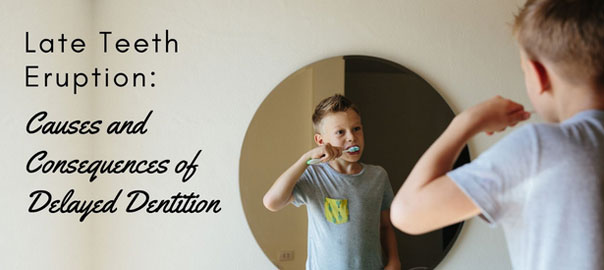
Delayed Dentition: Understanding Causes and Consequences of Late Teeth Eruption
Delayed dentition, also known as delayed tooth eruption, is a condition where a child’s teeth erupt later than the expected age range. The process of primary tooth eruption usually begins around six months of age and continues until all 20 primary teeth are present, which typically occurs by the age of three years.
For permanent teeth, the eruption process begins around the age of six years and continues until around 12-13 years when all permanent teeth are in place.
Causes of Delayed Dentition
- Genetic Factors:Delayed dentition can be influenced by genetic factors, as the timing of tooth eruption is partially inherited from parents. If either parent had a delayed eruption, there is a possibility that their child may also experience the same.
- Systemic Conditions:Certain medical conditions and systemic disorders can affect the timing of tooth eruption. These conditions may include hormonal imbalances, hypothyroidism, and certain genetic syndromes like Down syndrome.
- Nutritional Factors:Poor nutrition, particularly deficiencies in essential vitamins and minerals, can lead to delayed tooth development. Adequate intake of calcium, vitamin D, and other nutrients is essential for healthy tooth formation.
- Premature Loss of Primary Teeth:If a child loses their primary teeth too early due to trauma or dental disease, the permanent teeth may erupt later than expected as well.
- Preterm Birth: Babies born prematurely may experience delayed tooth eruption compared to those born at full-term.
Consequences of Delayed Dentition
- Speech and Language Development:Delayed dentition can impact a child’s speech and language development, as the eruption of teeth plays a crucial role in forming certain speech sounds correctly.
- Chewing and Nutrition:Delayed tooth eruption can affect a child’s ability to chew food properly, leading to potential nutritional deficiencies.
- Psychological Impact:Children with significantly delayed dentition might experience emotional and social challenges, such as lowered self-esteem or teasing from peers.
- Dental Misalignment:If primary teeth are retained for an extended period, it may lead to dental crowding and misalignment of the permanent teeth once they start erupting.
Treatment and Management
The treatment for delayed dentition depends on the underlying cause and its severity. If the delay is within the normal range and no significant issues are present, no specific treatment may be required. However, if there are concerns regarding speech development, nutrition, or self-esteem, consulting a pediatric dentist or orthodontist is essential.
Early intervention may involve monitoring the child’s dental development, providing dietary advice, and ensuring proper oral hygiene practices. In some cases, dental interventions like space maintainers or orthodontic devices may be recommended to address dental misalignment or support the eruption of permanent teeth.
In conclusion, delayed dentition can have various causes, and it’s important for parents and caregivers to be aware of the potential consequences and seek professional advice if they have concerns about their child’s tooth eruption timeline. Regular dental check-ups can help identify any issues early on and ensure appropriate management.
Leave a Reply
Leave a Reply
Explore More Similar Posts
Explore More Blogs


Leave a Reply